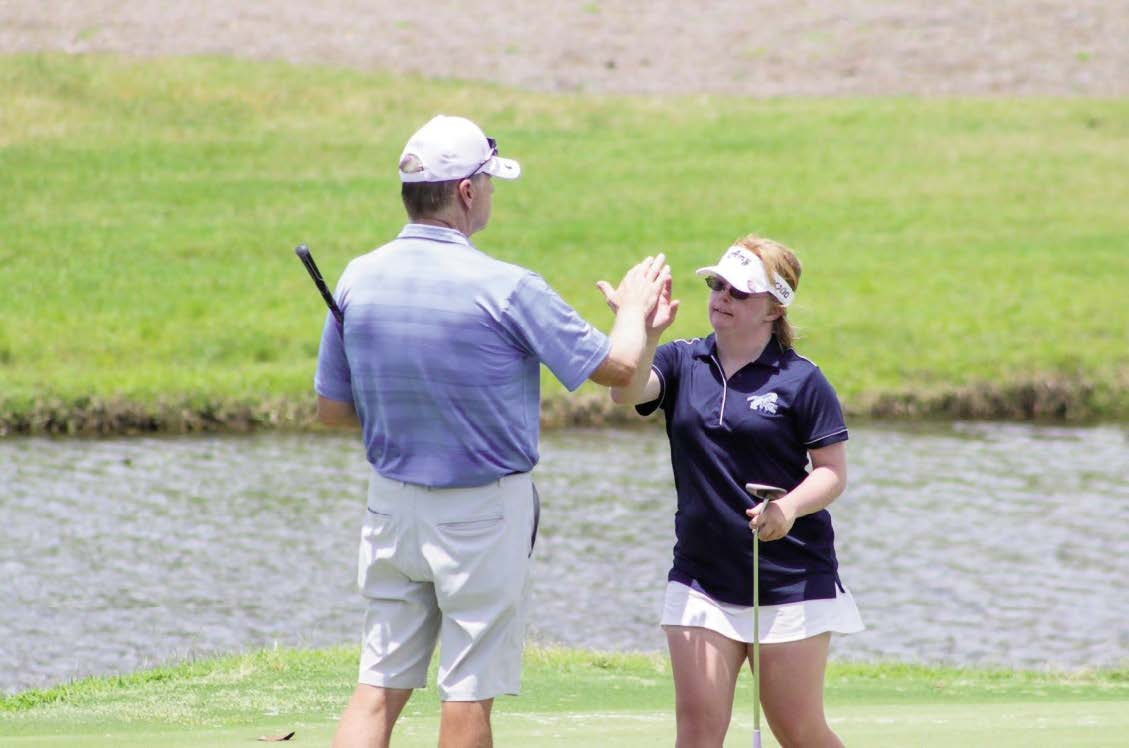that time was that I would not see her play high school sports. I would not go to the volleyball tournaments, the softball tournaments. Her older sister had played competitive volleyball, competitive swimming, and softball. I thought "I'll never get to see Amy do that." Roll forward about 15 years, and that's just a silly notion. Not only do I get to see her play competitive sports, but I am actually on the field with her, helping her. From a sports dad's perspective, it doesn't get any better than that.
FS: Absolutely. Does your older sister play golf, Amy?
AB: Yes, she does. JB: Although Amy's the best golfer in the family.
AB: Yeah.
FS: Amy, I'm going to ask some questions. If you would like dad to answer, it's fine. If you want to do some answering, I'm going to leave it up to you. I don't know if dad told you about the magazine. It talks about different special needs, different disabilities. There's a lot of readers that may also have Down syndrome, and so some of these questions will help them. For instance, were there specific challenges due to having Down syndrome that happened during development or during school? JB: You want me to take that?
AB: Yeah, go ahead.
JB: In school, we were always strong in the inclusion movement. When Amy was very young, she went to Montessori school up until maybe fourth grade. Then we moved out to Phoenix, and she was in regular ed classes, except for pull-out, like math and reading and those sorts of things. There were superheroes and also folks that weren't as supportive. That's typical of the disability world. But she always benefited greatly from being part of a larger social group. She was a volleyball manager in grade school. When she got to high school, she played on the regular girls' golf team, for four years. She's always been very comfortable socially. When Amy started playing golf, her coach, Matt Acuff, had never taught an athlete with Down syndrome or special needs. The early years were a combination of problem-solving and teaching, repetition, what would get through to Amy, what would work, and what didn't work. We all worked hard on making the experience the best we could for her, the best we could for him, and to be as efficient as we could for her to grasp the concepts and build a golf swing. Matt was and is a fantastic golf coach. He is very comfortable with high repetition, very simple teaching principles, and a lot of constancy. Many of the things that we figured out in teaching Amy have helped him teach others. Folks often ask "Where did Amy get this beautiful golf swing?" This is 12 years.
FS: Well, that gives us hope that it doesn't have to be overnight.
JB: Exactly. I think Amy loves the access that golf has given her to a broader experience. Because of golf, she's been to some of the coolest places, and met some of the neatest people. It's a great equalizer, because she plays golf better than lots of typical peers or adults. It earns respect, credibility, and a ticket to these fabulous opportunities.
FS: That's wonderful. Would you say that her physical development was on target, or were there some challenges there?

PROUD PAPA: Amy's dad congratulates her on a good putt; "When Amy was born I grieved that I would not see her play high school sports. Not only do I get to see her play competitive sports, but I am actually on the field helping her. From a sports dad's perspective, it doesn't get any better than that."